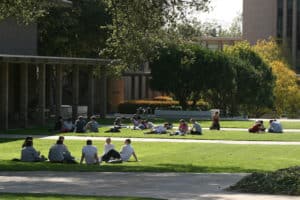Liberal Arts Colleges with Engineering Programs: Six to Consider
Written by CIT Consultant Tiffany Eggers

Once a student has decided to become an engineer, the next significant choice is where to study. Course lists and major requirements are only part of what students should consider. Students are happiest with their decisions if they have carefully pondered the types of teaching and living environments in which they excel. Some students are excited by the idea of life at a large university and the chance to focus intensely on one area of study, while others are overwhelmed by those prospects. Choosing an engineering program at a liberal arts college may allow the latter to combine a rigorous engineering education with a broad-based liberal arts curriculum in a more intimate setting.
There are several advantages to attending a liberal arts college with an engineering program. First, students can take a wide range of classes outside of engineering. Many prospective engineering students don’t want to give up the chance to take courses in literature, philosophy, or history. A variety of coursework can be enjoyable and help students develop critical thinking, communication, and problem-solving skills essential for success in any field. Second, liberal arts colleges typically have smaller class sizes than large research universities. Students often receive more personalized attention from their professors and form closer relationships with their classmates. Third, A liberal arts college education can be a great way to improve non-technical skills like writing and presenting, which can be helpful later in the workplace.

Harvey Mudd College Campus
The types of engineering programs offered at liberal arts colleges vary from school to school. Some schools provide traditional four-year engineering programs with various engineering majors, while others offer 3-2 or 3-3 programs in partnership with other institutions. 3-2 and 3-3 programs allow students to complete their liberal arts education at one school and then transfer to another school to complete their engineering education.
6 Great Liberal Arts Colleges with Engineering Programs:
- Harvey Mudd College (Claremont, CA): Harvey Mudd College is a private liberal arts college known for its strong engineering, math, and science programs. The college offers nine undergraduate engineering majors including Aerospace, Agricultural, Biomedical, Chemical, and Civil. All engineering students must take a core curriculum, establishing fundamental knowledge needed by an engineer practicing in the field. However, Harvey Mudd’s curriculum is also flexible enough that students may spend up to a year studying abroad if they wish. The engineering program at Harvey Mudd is known for its strong faculty, and experts in their fields who are committed to teaching and mentoring their students. As juniors and seniors, engineering students may work in the Engineering Clinic, solving problems for real clients under faculty guidance. The school’s engineering program is among the top-ranked in the country, and its graduates are highly sought-after by employers.
- Olin College of Engineering (Needham, MA): Olin College of Engineering’s curriculum embraces the liberal arts tradition. The college’s academic curriculum is based on the “Olin Triangle,” which focuses on science and engineering fundamentals, entrepreneurship, and the liberal arts. Olin is a close-knit community with nearly all students living on their beautiful 75-acre campus. Students take 6-7 arts, humanities, and social science courses. Embracing innovation, Olin employs a teaching and learning engineering model centered on collaboration between faculty and students, rejecting traditional structures like departments and tenured faculty. They aim to transform “the definition of what engineering is, how engineering is taught, and what an engineer looks like.”
- Bucknell University (Lewisburg, PA): Bucknell University’s College of Engineering offers eight bachelor of science majors: Biomedical, Chemical, Civil, Computer, Computer science, Electrical, Environmental, and Mechanical. The college’s engineering programs are known for their strong theoretical foundation and practical application. The first two years of the electrical and computer engineering programs have the same course requirements, allowing students to switch between programs easily. Bucknell also offers an early Engineering EXCELerator program for incoming engineering students who want to develop their skills in design and get a head start in calculus and physics. Bucknell graduates have a very high job placement rate.
- Rose-Hulman Institute of Technology (Terre Haute, IN): Rose-Hulman Institute of Technology is a liberal arts college known for its focus on undergraduate engineering. Rose-Hulman students enjoy a project-based curriculum where they work on real engineering problems from the very beginning of their studies and have the opportunity to work with faculty members on cutting-edge research. Rose-Hulman offers one of the few undergraduate Optical Engineering programs in the country. With this degree, students pursue careers in many industries, including automated inspection, fiber optic communications, laser devices, radar systems, and data storage. Rose-Hulman graduates are in high demand by employers.
- Franklin & Marshall College (Lancaster, PA): Franklin & Marshal College offers a unique Bachelor of Arts in Engineering (BAE) degree, combining a deep liberal arts education with engineering fundamentals. This degree focuses on interdisciplinary learning and real-world problem-solving, with specializations such as Materials Science & Biomedical Engineering. F&M also offers dual degree programs with four top-ranked engineering institutions: Case Western Reserve, Columbia University, Washington Univerity, and RPI. Once students complete the dual degree program, they receive a Bachelor of Arts degree in the major they choose from F&M and a Bachelor of Science degree in engineering from the partner institution.
- Earlham College (Richmond, IN): Earlham offers a new Bachelor of Arts in Engineering focusing on sustainability and social justice. Earlham’s new engineering program is about more than systems and structures—it’s about approaching the world’s messy, complicated problems with a sense of compassion and justice. Earlham College promises a unique guarantee that each student will have access to a fully funded, career-discerning experience, such as an internship or faculty-led research experience at home or around the world. This experience is funded, up to $5,000, through the generosity of Earlham’s donors. After its first cohort graduates, Earlham is on track to be accredited by the Accreditation Board of Engineering and Technology (ABET).
These are only a few examples of liberal arts colleges offering engineering. There are many more excellent schools to consider and explore, with various emphases and opportunities. If a student is interested in pursuing a career in engineering but also wants the benefit of a well-rounded education, then a liberal arts college with an engineering program may be just the right choice.
